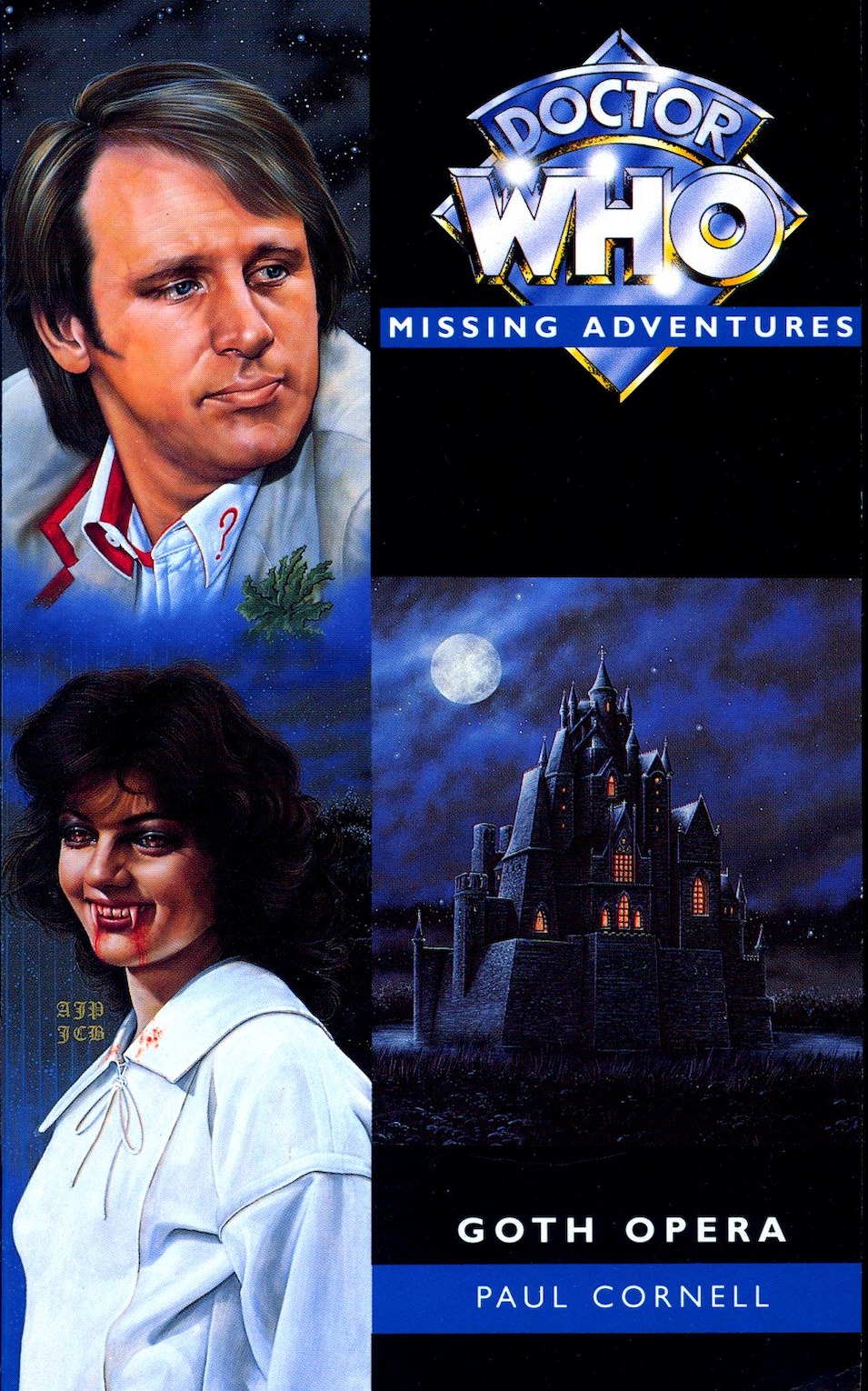 Story: A TARDIS arrives in Manchester, 1993, where some young human-born vampires have established a feeding ground. But it’s not the Doctor’s TARDIS – instead, a Time Lady named Ruath has come to gather local vampires to help her unearth and revive a “vampire messiah” descended from the Great Vampire banished by Rassilon. Having traced the Doctor’s fifth incarnation to the present day, Ruath sends the vampires out to collect Time Lord blood for their messiah, but instead they claim Nyssa as one of their own. Nyssa eventually leaves the Doctor and Tegan behind, joining Ruath, the revived Yarven, and a growing number of new vampire initiates. When an abrupt nightfall occurs during daylight hours, only then does the Doctor realize that Yarven and Ruath plan to plunge Earth into eternal night – and to turn its human population into either new vampire followers…or food.
Story: A TARDIS arrives in Manchester, 1993, where some young human-born vampires have established a feeding ground. But it’s not the Doctor’s TARDIS – instead, a Time Lady named Ruath has come to gather local vampires to help her unearth and revive a “vampire messiah” descended from the Great Vampire banished by Rassilon. Having traced the Doctor’s fifth incarnation to the present day, Ruath sends the vampires out to collect Time Lord blood for their messiah, but instead they claim Nyssa as one of their own. Nyssa eventually leaves the Doctor and Tegan behind, joining Ruath, the revived Yarven, and a growing number of new vampire initiates. When an abrupt nightfall occurs during daylight hours, only then does the Doctor realize that Yarven and Ruath plan to plunge Earth into eternal night – and to turn its human population into either new vampire followers…or food.
Review: It’s nigh-impossible to tell a straightforward vampire story in the Doctor Who mythos, thanks to a 1980 four-parter, State Of Decay, that inextricably intertwined vampire and Time Lord iconography. Paul Cornell manages to build on that even further, even drawing The Curse Of Fenric‘s bloodsucking haemovores into the fold. It all hangs together quite well, and Cornell makes excellent (and quite disturbing) use of existing vampire lore. (Apparently bookstores and distributors were disturbed by Alistair Pearson’s cover art – though the bloodier version was taken directly from a scene in the book, it was toned down before hitting the stores.)
 Prior to “Goth Opera”, I had only read Cornell’s New Adventures novels featuring the seventh Doctor, Ace and Bernice, so it’s interesting to see him work with a different incarnation of the Doctor. Actually, Cornell’s biggest triumph of characterization may be with his portrayal of Tegan, giving her some depth that helps to justify her sometimes aggravating demeanor. Nyssa he also handles well, though she’s largely behaving out of character for much of the book for obvious reasons. As for the Doctor, Cornell manages to nail his dialogue and attitudes right, but toward the end of the book there’s some devious-planning-ahead that really seems more in line with the seventh Doctor than the fifth; but even there it’s due to a message the Doctor receives from Romana in a sequence that follows on from the New Adventures novel “Blood Harvest”. That book is closely connected to this book’s storyline, but it’s not a pre-requisite – “Goth Opera” stands alone nicely, though now I wish I had a copy of “Blood Harvest” so I could put the whole circular story arc together.
Prior to “Goth Opera”, I had only read Cornell’s New Adventures novels featuring the seventh Doctor, Ace and Bernice, so it’s interesting to see him work with a different incarnation of the Doctor. Actually, Cornell’s biggest triumph of characterization may be with his portrayal of Tegan, giving her some depth that helps to justify her sometimes aggravating demeanor. Nyssa he also handles well, though she’s largely behaving out of character for much of the book for obvious reasons. As for the Doctor, Cornell manages to nail his dialogue and attitudes right, but toward the end of the book there’s some devious-planning-ahead that really seems more in line with the seventh Doctor than the fifth; but even there it’s due to a message the Doctor receives from Romana in a sequence that follows on from the New Adventures novel “Blood Harvest”. That book is closely connected to this book’s storyline, but it’s not a pre-requisite – “Goth Opera” stands alone nicely, though now I wish I had a copy of “Blood Harvest” so I could put the whole circular story arc together.
Overall, it’s a very enjoyable book, on a par with Cornell’s other work. His prose often inspires sympathy and compassion for its frequently torn and otherwise tortured characters, and uncomfortable feelings as well when he turns something like a baby into a sinister thing (he also did this in “Love And War”, and even when I recognize it from a literary standpoint as a recurring motif, my gut instinct is still to squirm a bit). And that may very well be why Cornell has landed a gig as one of the writers of the new series, so I’m looking forward to his contributions to future Who.
Year: 1993
Author: Paul Cornell
Publisher: Virgin
Pages: 272



